四六级口语常用句型
大学英语六级常用口语118句
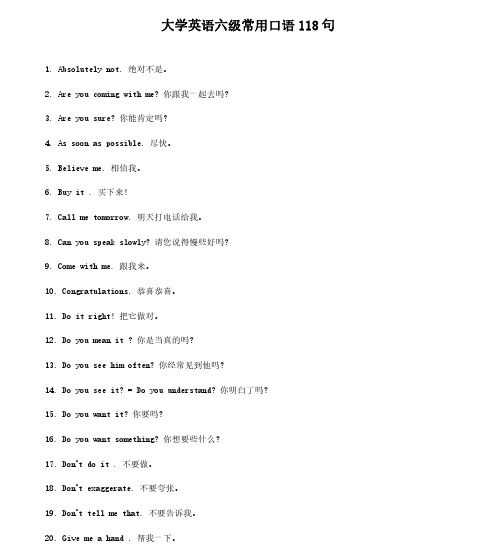
大学英语六级常用口语118句1.Absolutely not.绝对不是。
2.Are you coming with me?你跟我一起去吗?3.Are you sure?你能肯定吗?4.As soon as possible.尽快。
5.Believe me.相信我。
6.Buy it.买下来!7.Call me tomorrow.明天打电话给我。
8.Can you speak slowly?请您说得慢些好吗?e with me.跟我来。
10.Congratulations.恭喜恭喜。
11.Do it right!把它做对。
12.Do you mean it?你是当真的吗?13.Do you see him often?你经常见到他吗?14.Do you see it?=Do you understand?你明白了吗?15.Do you want it?你要吗?16.Do you want something?你想要些什么?17.Don‟t do it.不要做。
18.Don‟t exaggerate.不要夸张。
19.Don‟t tell me that.不要告诉我。
20.Give me a hand.帮我一下。
21.Go right ahead.一直往前走。
22.Have a good trip.祝旅途愉快。
23.Have a nice day.祝你一天过得愉快。
24.Have you finished?你做完了吗?25.He doesn‟t have time.他没空。
26.He is on his way.他现在已经在路上了。
27.How are you doing?你好吗?28.How long are you staying?你要呆多久?29.I am crazy about her.我对她着迷了。
30.I am wasting my time.我在浪费时间。
31.I can do it.我能做。
大学英语四六级优秀英语表达摘录(口语,作文,翻译)
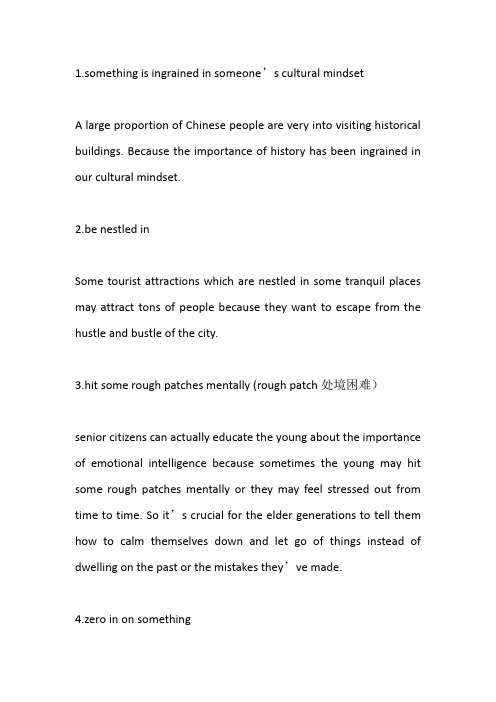
1.something is ingrained in someone’s cultural mindsetA large proportion of Chinese people are very into visiting historical buildings. Because the importance of history has been ingrained in our cultural mindset.2.be nestled inSome tourist attractions which are nestled in some tranquil places may attract tons of people because they want to escape from the hustle and bustle of the city.3.hit some rough patches mentally (rough patch处境困难)senior citizens can actually educate the young about the importance of emotional intelligence because sometimes the young may hit some rough patches mentally or they may feel stressed out from time to time. So it’s crucial for the elder generations to tell them how to calm themselves down and let go of things instead of dwelling on the past or the mistakes they’ve made.4.zero in on somethingHaving daily routines every day helps people zero in on their study better. It boosts their productivity and efficiency.5.scroll through social media feeds frequentlyBasically, there’re more inclined to scroll through social media feeds frequently. Because they’ve already grown so addicted to them.。
六级口语模板万能句型

六级口语模板万能句型作为英语学习的一个重要部分,口语是检验学习成果的重要手段之一。
然而每个人的口语能力都有差异,一些人面对口语考试会比较紧张而发挥不好。
今天,本文将会为大家介绍一些六级口语模板和万能句型,帮助大家更好地备考口语考试。
一、开头万能句型在口语考试的开头,我们需要有一个好的引子来引入我们想要表达的内容。
以下是一些典型的开头万能句型:1. Hello everyone, my name is XX, and I am really glad to be here today.2. Good morning/afternoon/evening, ladies and gentlemen. Thank you for giving me this opportunity to speak here today.3. As an old saying goes, “XXXXXXXXXX” (引用一则名言). Based on this concept, today I’d like to talk about XXXXX.这些开头的句型虽然简单,但是足以引起考官的注意,让人们对你的演讲感到自然舒适。
二、论述万能句型在论述的过程中,我们最好能够使用一些万能句型来增加口语的准确性和说服力。
1. To begin with, let's take a look at the first argument for/against...2. Another reason why I believe...3. Furthermore, it has been proven that...4. As a matter of fact, research has shown that...这些句型很好地展示了我们的逻辑思维和语言功力,让我们的表述更加充实和有说服力。
三、结论万能句型一个漂亮的结论可以让我们印象深刻,把我们的观点明确地传递给考官。
大学英语四级口语训练素材大全整理

大学英语四级口语训练素材大全整理高校英语四级口语训练素材大全由于常常听到有同学找不到练习的材料,所以今日我就为大家整理出来了,接着往下看吧!下面是我整理的高校英语四级口语训练素材大全,欢迎大家阅读共享借鉴,盼望对大家有所关心。
更多英语四级相关内容推举↓↓↓高校英语四级口语训练素材一、英语四级口语素材:Culture中西文化对比与沟通;文化古迹;中华优秀传统文化;了解文化的方式以及好处Q1:Can you name some traditional Chinese festivals? Do you like them? Why?Q2:Should a city try to preserve its old, historic buildings or destroy them and replace them with modern buildings?Q3:Should government give financial support to build museums and theaters? State your opinion and explain why?这三道题的目的是要求考生陈述出来传统文化的重要性。
所以各位在作答的时候,尽量往传统文化重要性去靠近。
记得陈述的时候,说出其内在美以及外部影响力。
Traditional cultures should be protected. because first, they serve asa mirror to remind modern people of their past that they should be proud of. Take the Chinese New Year as an example, no one could resist the charm of a family reunion dinner and family members make toasts for each other in order to wish for joy, peace, health and fortune for the next year. Secondly, they can attract visitors from abroad to experience the traditional thing, which is a big support to the tourism industry and the economy. Therefore, it is necessary to bring funding to support traditional culture no matter in what kind of form.二、英语四级口语素材:Relations Between the Young and Their Parents People you admire家庭成员;叙述自己的家庭;家庭生活的转变;与父母一起住的好坏;亲子关系的处理;崇拜的人;如何维系家庭Q: Describe a person that you look up to as a role model. Explain how this person influenced your life. Include details and examples to support your response.First, she never gives up her own dream. Under the difficult situations, she keeps pursuing her dream supported by her own strong spirit and she successfully becomes the leader of her country and realizes her goal. She inspires me to realize my own dream of getting a high CET grade.Second, she is a person with kind-heartedness. She never hesitates to give others a hand when they fall into troubles and helps them go through without asking for any reward. From her, I learn that I should be grateful to those who help me and be ready to help others.三、英语四级口语素材:Transportation城市交通状况;交通工具及好处;缓解交通压力;让人满足或不满足的地方Q:What is the most efficient transportation in your country?The most efficient transportation in my country, I’d say, is subway. First, it is really convenient for the passengers to arrive at their destinations as it almost covers every corner in our city. And second, compared with bicycle, it has high speed, people don’t need to worry about their time, traffic jam or parking space. What’s more, subway is far more eco-friendly than vehicles. So frankly speaking, subway is the most efficient transportation.四、英语四级口语素材:Education高等教育;高等教育对同学的要求;高校排名;高校专业的选择;住宿问题Q1:What do you think education should be? Should it be a process of learning what is useful for your future life or should it be simply learning for enjoyment? Why?Q2:If you had the opportunity to change your major, what would you do with it?Q3:Agree or disagree with the following statement? College education should only be available to people who have done well in secondary school.In today’s society college education is much more common that itgradually becomes part of the general education. Almost all of the lucrative work positions ask for a bachelor’s degree at least. Hence offering college education to all of the students is the fair thing to do.Some students might discover their passion for learning or their advantages at a later time. Offering them post-secondary education is one more opportunity for them to study up and get better training. The possibility of entering college is a right each student should have.英语四级口语考什么一、考试力量等级口语考试分为ABCD四个等级。
6级口语考试自我介绍

6级口语考试自我介绍1. 嗨,大家好!我是[你的名字],今天来跟你们唠唠我自己,就像跟老朋友聊天似的。
我觉得六级口语考试就像一场奇妙的冒险,而我这个小探险家就要在这儿介绍自己啦。
我呀,是个超级好奇的人,对啥新鲜事儿都想凑个热闹。
比如说,新出了个啥科技小玩意儿,我就像只小蜜蜂看到花朵一样,立马飞过去瞧个究竟。
2. 我呢,在生活里就像个调色盘,五彩斑斓的。
有时候热情似火,像那夏天的大太阳。
就说上次参加志愿者活动吧,我那积极性,简直能把周围的人都点燃。
我也有安静的时候,就像冬日里的小猫咪,窝在角落里静静地看书。
我想这就是我,充满了各种不同的色彩和情绪。
这和六级口语考试也有点像哦,需要展现自己不同的面。
3. 我叫[你的名字],来自一个充满烟火气的小地方。
那地方虽小,可就像个宝藏盒子,藏着数不清的美好回忆。
我在那儿长大,就像一颗小树苗在那片土地上扎根。
我身边的人呢,就像阳光雨露,滋养着我。
我爸,是个特幽默的人,他讲的笑话就像一把把小钥匙,总能打开我不开心时候的那把锁。
我觉得这种家庭环境让我变得乐观又开朗,就像向日葵总是向着太阳。
我希望把这种积极的情绪带到六级口语考试里。
4. 嘿,你们知道吗?我有个小癖好,就是收集各种小本子。
我看到那些精美的小本子,就像女孩子看到漂亮的小裙子一样,走不动道儿了。
我把这些小本子当成我的小秘密基地,有时候在上面写些自己的小心情,就像跟一个最知心的朋友倾诉一样。
这就像我对待六级口语考试一样,我把它当成一个和外界交流的窗口,想把自己的故事和想法都分享出去。
5. 我呀,在学习的道路上就像个小蜗牛,虽然爬得慢,但一步一个脚印。
有时候遇到难题,我就像个迷路的小羊羔,有点不知所措。
但是我从不放弃呀,就像那打不死的小强。
我会找各种方法去解决问题。
六级口语考试对我来说也是一个挑战,不过我就像个勇敢的战士,准备好迎接它啦。
6. 我觉得自己像个小厨师,生活就是我的厨房。
我每天都在这个大厨房里,把各种经历和知识当成食材,烹饪出属于自己的独特味道。
四六级语法知识点详解

四六级语法知识点详解英语四六级考试是大学英语水平考试的一种,对于很多学生来说,语法是其中一个比较难以掌握的部分。
本文将详细解释四六级考试中常见的语法知识点,帮助学生更好地应对考试。
一、时态和语态1. Simple Present Tense(简单现在时)简单现在时表示经常或习惯性发生的动作、真理、客观存在的事实等。
结构:主语 + 动词原形(第三人称单数在动词后加s或es)例句:I eat breakfast every morning.(我每天早上吃早餐)2. Present Continuous Tense(现在进行时)现在进行时表示现在正在进行的动作。
结构:主语 + am/is/are + 动词ing形式例句:She is studying in the library now.(她正在图书馆学习)3. Simple Past Tense(简单过去时)简单过去时表示过去某个时间发生的动作或存在的状态。
结构:主语 + 动词过去式例句:They visited their grandparents last weekend.(他们上周末去看望了他们的祖父母)4. Past Continuous Tense(过去进行时)过去进行时表示过去某个时间正在进行的动作。
结构:主语 + was/were + 动词ing形式例句:I was watching TV when she called me.(她打电话给我时,我正在看电视)5. Simple Future Tense(简单将来时)简单将来时表示将来要发生的动作或存在的状态。
结构:主语 + will + 动词原形例句:We will have a party next week.(我们下周要开个派对)6. Future Continuous Tense(将来进行时)将来进行时表示将来某个时间正在进行的动作。
结构:主语 + will be + 动词ing形式例句:I will be sleeping when you arrive.(当你到达时,我将正在睡觉)7. Passive Voice(被动语态)被动语态用于强调动作的承受者而不是施动者。
四级口语万能句子

四级口语万能句子四级口语万能句子:一、日常交往1. Hello, my name is [your name]. Nice to meet you. 你好,我叫[你的名字]。
很高兴认识你。
2. How are you?/ How have you been?你好吗?/最近怎么样?3. I'm good/fine, thank you. And you?我很好,谢谢。
你呢?4. What do you do for a living?你以什么为生?5. What are your hobbies?你的爱好是什么?6. What kind of music/movie do you like?你喜欢什么类型的音乐/电影?7. How was your weekend?你的周末过得怎么样?8. What are your plans for the evening?你今晚有什么计划?9. Have you ever been to [place]?你去过[地方]吗?10. Can you recommend a good restaurant around here? 你可以推荐附近的一个好餐厅吗?11. What do you think of [topic]?你对[话题]有什么看法?12. I'm sorry, I didn't catch that. Could you please repeat? 对不起,我没听清楚。
你能重复一下吗?13. Could you speak a bit slower, please?你可以说慢一点吗?二、购物和旅游1. How much does this cost?这个多少钱?2. Can I get a discount?可以打折吗?3. Where is the nearest mall/shopping center?最近的购物中心在哪里?4. Do you have this in a different size/color?你们有这个的其他尺码/颜色吗?5. I'm looking for a souvenir to bring back home.我想找一件纪念品带回去。
六级英语常用句型
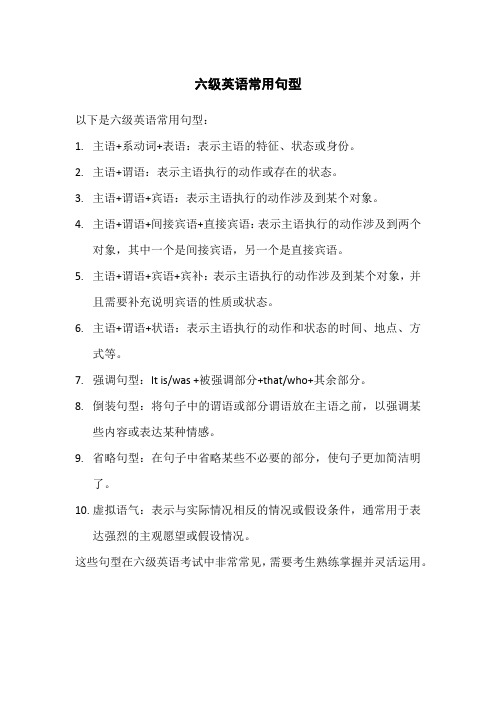
六级英语常用句型
以下是六级英语常用句型:
1.主语+系动词+表语:表示主语的特征、状态或身份。
2.主语+谓语:表示主语执行的动作或存在的状态。
3.主语+谓语+宾语:表示主语执行的动作涉及到某个对象。
4.主语+谓语+间接宾语+直接宾语:表示主语执行的动作涉及到两个
对象,其中一个是间接宾语,另一个是直接宾语。
5.主语+谓语+宾语+宾补:表示主语执行的动作涉及到某个对象,并
且需要补充说明宾语的性质或状态。
6.主语+谓语+状语:表示主语执行的动作和状态的时间、地点、方
式等。
7.强调句型:It is/was +被强调部分+that/who+其余部分。
8.倒装句型:将句子中的谓语或部分谓语放在主语之前,以强调某
些内容或表达某种情感。
9.省略句型:在句子中省略某些不必要的部分,使句子更加简洁明
了。
10.虚拟语气:表示与实际情况相反的情况或假设条件,通常用于表
达强烈的主观愿望或假设情况。
这些句型在六级英语考试中非常常见,需要考生熟练掌握并灵活运用。
四六级 万能句式 -回复

四六级万能句式-回复
四六级考试中,万能句式可以帮助考生更好地组织和表达观点,提升写作和口语的流利度。
以下是一些常用的四六级万能句式:
1. 引出观点:
- 从我的角度来看...
- 毫无疑问,...
- 近年来,...
- 随着社会的发展,...
2. 表达同意或支持:
- 我完全赞同这一观点,因为...
- 确实如此,理由在于...
- 不可否认,...
3. 表达反对或不同意见:
- 尽管有些人认为...,但我认为...
- 然而,我并不同意这种观点,主要是因为...
- 另一方面,我们必须考虑到...
4. 表述原因和结果:
- 主要原因是...
- 结果是...
- 因此,...
- 这导致了...
5. 过渡句:
- 首先,... 其次,... 最后,...
- 对于这个问题,一方面...,另一方面...
- 转折的是,...
- 类似的,...
6. 总结句:
- 综上所述,...
- 总而言之,...
- 因此,我们可以得出结论:...
- 回顾上述讨论,...
注意:这些句式虽好,但使用时需结合实际内容灵活运用,避免生搬硬套。
同时,积累词汇和提高语言运用能力更为关键。
英语四六级999个常用口语

1. I see.我明白了。
2. I quit! 我不干了!3. Let go! 放手!4. Me too.我也是。
5. My god! 天哪!6. No way! 不行!7. Come on.来吧(赶快)8. Hold on.等一等。
9. I agree。
我同意。
10. Not bad.还不错。
11. Not yet.还没。
12. See you.再见。
13. Shut up! 闭嘴!14. So long.再见。
15. Why not? 好呀! (为什么不呢?)16. Allow me.让我来。
17. Be quiet! 安静点!18. Cheer up! 振作起来!19. Good job! 做得好!20. Have fun! 玩得开心!21. How much? 多少钱?22. I'm full.我饱了。
23. I'm home.我回来了。
24. I'm lost.我迷路了。
25. My treat.我请客。
26. So do I.我也一样。
27. This way。
这边请。
28. After you.您先。
29. Bless you! 祝福你!30. Follow me.跟我来。
31. Forget it! 休想! (算了!)32. Good luck! 祝好运!33. I decline! 我拒绝!34. I promise.我保证。
35. Of course! 当然了!36. Slow down! 慢点!37. Take care! 保重!38. They hurt.(伤口)疼。
39. Try again.再试试。
40. Watch out! 当心。
41. What's up? 有什么事吗?42. Be careful! 注意!43. Bottoms up! 干杯(见底)!44. Don't move! 不许动!45. Guess what? 猜猜看?46. I doubt it 我怀疑。
四六级作文万能句子常用句型
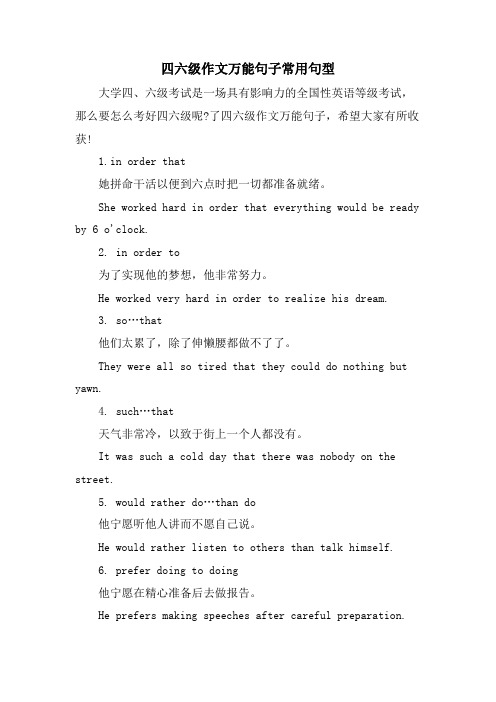
四六级作文万能句子常用句型大学四、六级考试是一场具有影响力的全国性英语等级考试,那么要怎么考好四六级呢?了四六级作文万能句子,希望大家有所收获!1.in order that她拼命干活以便到六点时把一切都准备就绪。
She worked hard in order that everything would be ready by 6 o'clock.2. in order to为了实现他的梦想,他非常努力。
He worked very hard in order to realize his dream.3. so…that他们太累了,除了伸懒腰都做不了了。
They were all so tired that they could do nothing but yawn.4. such…that天气非常冷,以致于街上一个人都没有。
It was such a cold day that there was nobody on the street.5. would rather do…than do他宁愿听他人讲而不愿自己说。
He would rather listen to others than talk himself.6. prefer doing to doing他宁愿在精心准备后去做报告。
He prefers making speeches after careful preparation.7. prefer to do…rather than do比起女人,男人总是宁可在家睡觉也不愿花那么多时间来购物。
Compared with women, men always prefer to sleep at home rather than spend so much time shopping.8. not only…but also在短短的三年的时间里她不但完成了所有课程,而且还获得了博士学位。
四六级常用短语
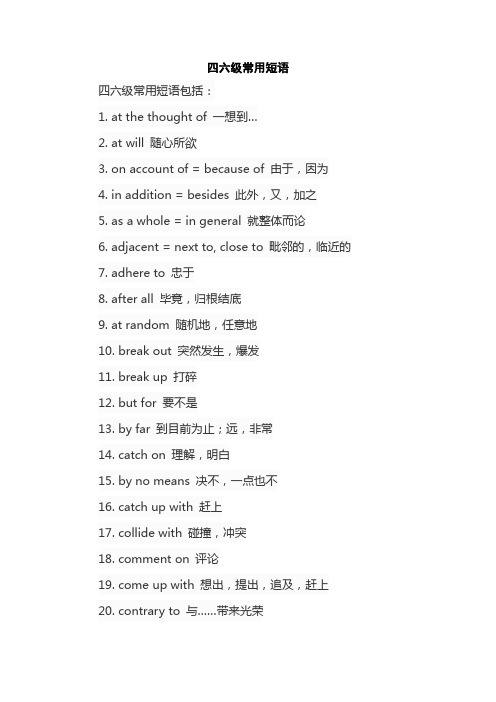
四六级常用短语四六级常用短语包括:1. at the thought of 一想到…2. at will 随心所欲3. on account of = because of 由于,因为4. in addition = besides 此外,又,加之5. as a whole = in general 就整体而论6. adjacent = next to, close to 毗邻的,临近的7. adhere to 忠于8. after all 毕竟,归根结底9. at random 随机地,任意地10. break out 突然发生,爆发11. break up 打碎12. but for 要不是13. by far 到目前为止;远,非常14. catch on 理解,明白15. by no means 决不,一点也不16. catch up with 赶上17. collide with 碰撞,冲突18. comment on 评论19. come up with 想出,提出,追及,赶上20. contrary to 与……带来光荣21. due to 因为22. go in for 从事,致力于23. go off 爆炸24. in between 在两者之间25. hang by a thread 千钧一发,岌岌可危26. heap praise upon 对……大加称赞27. in general 一般来说28. in particular 特别地29. in the long run 从长远来看30. on the whole 大体上说31. take into account 把……考虑进去32. to this end 为了这个目的33. with this object in view 为了这个目标。
大学英语六级口语8000句(精选)
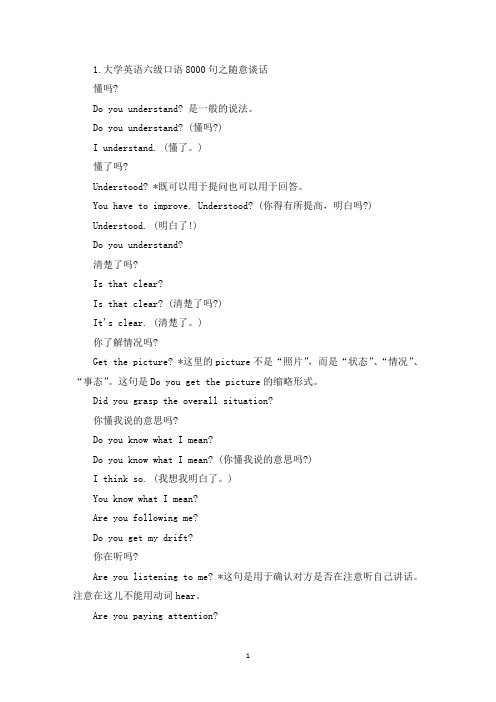
1.大学英语六级口语8000句之随意谈话懂吗?Do you understand? 是一般的说法。
Do you understand? (懂吗?)I understand. (懂了。
)懂了吗?Understood? *既可以用于提问也可以用于回答。
You have to improve. Understood? (你得有所提高,明白吗?)Understood. (明白了!)Do you understand?清楚了吗?Is that clear?Is that clear? (清楚了吗?)It's clear. (清楚了。
)你了解情况吗?Get the picture? *这里的picture不是“照片”,而是“状态”、“情况”、“事态”。
这句是Do you get the picture的缩略形式。
Did you grasp the overall situation?你懂我说的意思吗?Do you know what I mean?Do you know what I mean? (你懂我说的意思吗?)I think so. (我想我明白了。
)You know what I mean?Are you following me?Do you get my drift?你在听吗?Are you listening to me? *这句是用于确认对方是否在注意听自己讲话。
注意在这儿不能用动词hear。
Are you paying attention?你不知道吗?Are you blind? *blind 是“看不见的”、“盲目的”意思。
但在这里它表示的是“没察觉”、“不知道”的意思。
It's a great deal. (这可是笔大买卖。
)Are you blind? (你不知道吗?)Can't you see?What's the matter with you?你明白我说的意思吧。
盘点英语四六级口语考场上冷场或者尬聊时必备的转换口语句式整理
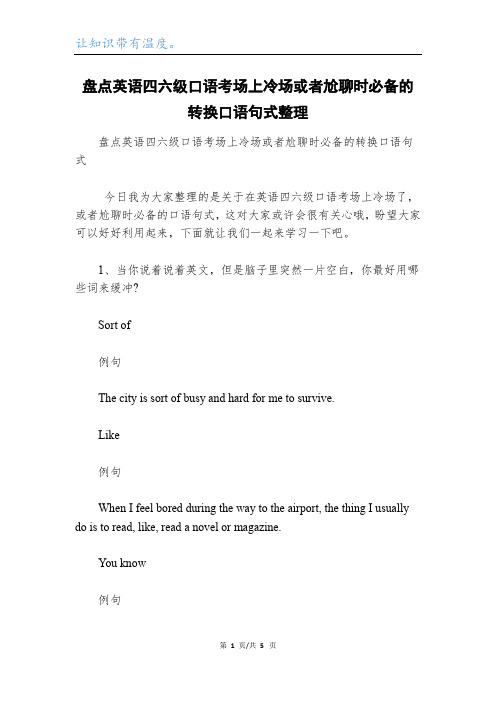
盘点英语四六级口语考场上冷场或者尬聊时必备的转换口语句式整理盘点英语四六级口语考场上冷场或者尬聊时必备的转换口语句式今日我为大家整理的是关于在英语四六级口语考场上冷场了,或者尬聊时必备的口语句式,这对大家或许会很有关心哦,盼望大家可以好好利用起来,下面就让我们一起来学习一下吧。
1、当你说着说着英文,但是脑子里突然一片空白,你最好用哪些词来缓冲?Sort of例句The city is sort of busy and hard for me to survive.Like例句When I feel bored during the way to the airport, the thing I usually do is to read, like, read a novel or magazine.You know例句San Francisco is one of the most beautiful cities in the world, you know, it locates near the sea.2、当你觉得一个人或事情很好很奇异,但是你又不想用good, interesting,amazing来表示的时候,你还可以用什么?caringadorablethoughtfulawesome例句Brook is a caring/awesome/adorable/thoughtful girl.decentclassy例句Oh, I think the sofa you bought is so decent/classy.have a blastfunkytrendy例句Have a blast in New York, you know, it is full of funky stuff and the girls there, say, are really trendy.3、当你觉得一个事情很糟糕,但是你又不想用bad, annoying来表示的时候,你还可以用什么?suckfreak outlousydrive me crazyScrew it up.Not make sense.trashIt makes my blood boil/up.I wouldnt bet on it.Couldnt be worse.It bothers me.Let it slide.4、当你想表示你特殊喜爱/不喜爱做某事,除了like/dislike,你还可以用什么?Im keen onis my cup of tea.appeals to me.Im intoIm crazy aboutIm enchanted byI cant bearI cant standI think sth. is a drag.sth. sucks.I dont care for/about5、当你想表示你常常/很少做某事,除了always/never,你还可以用什么?I cant help doing sth.I just do sth. all the time.I do sth. daily.I do sth. almost every second.I do sth. every other week.I do sth. occasionally.I seldom do sth.I do sth. once in a while.I rarely do sth.I hardly ever do sth.I do sth. once in a blue moon.文档内容到此结束,欢迎大家下载、修改、丰富并分享给更多有需要的人。
四级英语口语对话常用的句子范文
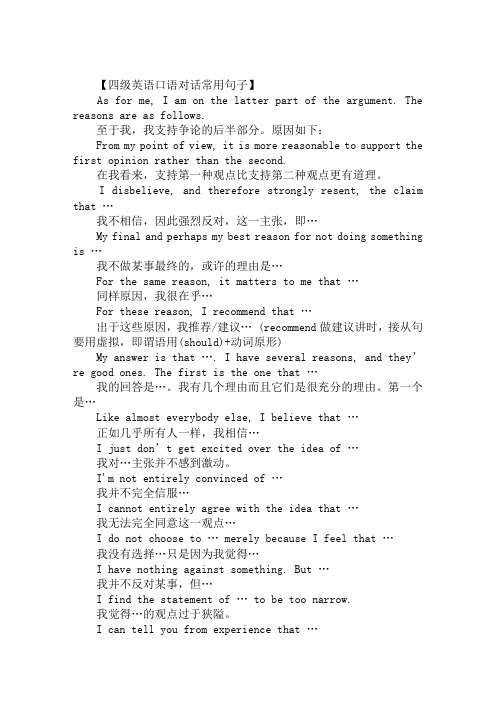
【四级英语口语对话常用句子】As for me, I am on the latter part of the argument. The reasons are as follows.至于我,我支持争论的后半部分。
原因如下:From my point of view, it is more reasonable to support the first opinion rather than the second.在我看来,支持第一种观点比支持第二种观点更有道理。
I disbelieve, and therefore strongly resent, the claim that …我不相信,因此强烈反对,这一主张,即…My final and perhaps my best reason for not doing something is …我不做某事最终的,或许的理由是…For the same reason, it matters to me that …同样原因,我很在乎…For these reason, I recommend that …出于这些原因,我推荐/建议… (recommend做建议讲时,接从句要用虚拟,即谓语用(should)+动词原形)My answer is that …. I have several reasons, and they’re good ones. The first is the one that …我的回答是…。
我有几个理由而且它们是很充分的理由。
第一个是…Like almost everybody else, I believe that …正如几乎所有人一样,我相信…I just don’t get excited over the idea of …我对…主张并不感到激动。
I'm not entirely convinced of …我并不完全信服…I cannot entirely agree with the idea that …我无法完全同意这一观点…I do not choose to … merely because I feel that …我没有选择…只是因为我觉得…I have nothing against something. But …我并不反对某事,但…I find the statement of … to be too narrow.我觉得…的观点过于狭隘。
英语四六级口语如何用英语来谈论年龄

英语四六级口语:如何用英语来谈论年龄年龄的精确表达1。
他三十岁:Heis thirty (yearsold).He is thirty years ofage.2。
他已经三十岁了:He is already thirty。
He has reached the age of thirty。
3.一个三十岁的男人:a thirty—year-old mana man ** is thirtya man of thirtya man aged thirtya man at the age ofthirty模糊表达1.他年近三十岁了:He is rly thirty。
He is r to thirty./He istoward thirty.Heis getting on thirty.He ishard on thirty。
2.他三十好几了:Heis in his middle thirty。
He is well over thirty。
3.他与我同岁:He is asold asI am.Heis as oldas me.称赞他人年轻1。
她看上去比实际年龄小:She looks younger than her years。
2。
她看上去比实际年龄小十岁:Shelooks ten years younger than her real age。
3.我年纪比你大:I am older then you.e。
g.I appreciate that。
Speaking of which, I was wond ering if I am olderthan you,b**useyou look so youn g。
非常感谢,说起这个,我在想我一定比你大因为你看起来很年轻.4。
她三十岁了,但看上去才二十岁:She is thirtybutlooks t wenty。
e.g. She is thirtybut sheappears young.她三十岁了,但看起来很年轻。
四六级句式

四六级句式在英语学习中,四六级考试一直被视为一个重要的里程碑。
很多学生都在备考过程中苦恼句子表达不够流畅,这时候,“四六级句式”就成为了他们的救命稻草。
“四六级句式”是指在写作和口语表达中常用的句式,它们通常是简单又通顺的,能够帮助学生更好地表达自己的意思。
在四六级考试中,使用这些句式可以使文章或演讲更加流畅自然,增加语言表达的多样性。
首先,常用的四六级句式之一是“there be”结构,即“there is/are/was/were”。
例如,“There is no denying that…”、“There are many reasons why…”等等。
这种句式能够帮助学生引出话题,使文章更加生动有趣。
其次,定语从句也是四六级句式中常见的一种。
通过使用定语从句,学生可以更加准确地描述人或事物。
比如,“The book that Iread yesterday was very interesting.”,这种句式可以增加句子的复杂性,提高文章的质量。
此外,倒装句也是四六级句式中的一种。
倒装句通常出现在英语的感叹句和条件句中,例如,“Little did he know that…”、“Not only does she speak English fluently,but also…”等等。
这种句式能够使文章更加生动有趣,增加语言表达的灵活性。
最后,从句也是四六级句式中常见的一种。
通过使用从句,学生可以更加深入地阐述自己的观点。
比如,“Although I don't like math,I have to study it.”,“When it comes to English,I think…”等等。
这种句式可以使文章更加连贯,增加语言表达的丰富性。
总的来说,“四六级句式”是英语学习中非常实用的工具,它们能够帮助学生更加准确地表达自己的意思,使文章或演讲更加流畅自然。
因此,在备考四六级考试的过程中,学生们不妨多多积累这些句式,相信它们一定能够为你的英语学习带来更大的帮助。
- 1、下载文档前请自行甄别文档内容的完整性,平台不提供额外的编辑、内容补充、找答案等附加服务。
- 2、"仅部分预览"的文档,不可在线预览部分如存在完整性等问题,可反馈申请退款(可完整预览的文档不适用该条件!)。
- 3、如文档侵犯您的权益,请联系客服反馈,我们会尽快为您处理(人工客服工作时间:9:00-18:30)。
1. What’s your name?2. Does your name have any special meaning?3. Where do you come from?4. What kind of landscape surrounds your hometown?5. What is the main crop in your hometown?6. What is the difference between Beijing and your hometown?7. What are the main places of interest in your hometown?8. What is the climate like in your hometown?9. What is the character of the people like in the region where you live?10. What are the differences in accent between the people of your hometown and Beijing?11. What is people’s favorite food in your region?12. How do you make dumplings?13. What do you do during the Spring Festival?14. Why is the Spring Festival so important to Chinese people?15. Can you describe one of the main festivals celebrated in your country?16. Tell me something about the Lantern Festival.17. Tell me something about the Qing Ming Festival.18. Tell me something about the customs of your country.19. How long have you lived in Beijing?20. What is the weather like in Beijing?21. How do you compare the climate in Beijing with that in your hometown?22. What place in Beijing do you like best? Why ?23. Which is the worst place y ou’ve been to China?24. Which is the best place you’ve been to China?25. What places in Beijing should a foreigner visit? Why?26. What are the major social problems in Beijing? How can they be solved?27. What is the biggest problem China faces?28. What places in Beijing should a foreigner visit? Why?29. Could you tell me something about your family?30. Have you any children?31. What is your child’s name? Does his name have a meaning?32. What does your wife/husband do?33. When did you get married?34. Describe your wedding.35. How have weddings changed in recent years?36. Are there any special customs about wedding in your region?37. Describe a traditional wedding ceremony.38. Where did you go for your honeymoon?39. Did you have to ask for permission from your parents before yougot married?40. Is it acceptable for couples to live together without marrying?41. Where do you think a newly couple should live? Living with their parents or on their own?42. What responsibilities should a couple take?43. How do Chinese usually celebrate birthdays?44. Are there any traditions concerning the birth of a baby?45. What kind of parent do you intend to be?46. What do you think of One-Child Policy in China?47. Why do people in China traditionally want to have a son?48. What difficulties do Chinese farmers have concerning their old age?49. What do you think needs to be done in order to relieve the farmer’s worries?50. What hope or fears do you have for your children?51. What sort of culture do you hope your child will grow up in?52. Are you going to bring up your child differently from the way you were brought up? How?53. Do you enjoy shopping?54. Who does most of the shopping in your family?55. What are you good at cooking? What is your favorite dish?56. Who does most of cooking in your family?57. Is there sex discrimination in China?58. How do you sum up women’s conditions in China?59. What are the causes of sex discrimination?60. Should government pay certain salaries to those housewives? Why or why not?61. Would you want your wife to continue with her career or to stay at home taking care of the household after you get married?62. Have you ever wished to be one of the opposite sex? Why (why not)?63. What would you do if your next-door neighbour were noisy nearly all the time?64. Do you have a lot of friend?65. What does friendship mean to you? What kind of people do you make friend with?66. What is your major?67. How do you like your major?68. When and where did you graduate? What qualifications have you obtained?69. Do you still remember your school days?70. What impressed you most when you were at university?71. Which is the best university in your country?72. Could you sum up your own study habits in a few points?73. What do you think of the practice of setting up key schools inprimary and secondary school education in China?74. Do you think the subjects you are studying today are relevant to present-day society? Why ?75. What do you think education should be? Should it be a process of learning what is useful for your future life or should it be simply learning for enjoyment? Why?76. What do you do for a living?77. What do you do in the office every day?78. Since your job seems too professional to me, could you explain it in detail?79. What are your job prospects?80. If you had the opportunity to change your job, what would you do with it?81. Do you have any ambitious?82. Will any possible future changes affect your job in any way?83. What are your spare time interests?84. How do you spend your weekends?85. What is your favorite sport? What are the rules?86. What is the most popular sport in your country?87. What are the sporting facilities like in your university/Beijing?88. What do you know about Qigong? Do you believe in Qigong?89. What do you do in your spare time?90. Do you often read newspapers? If not, why ones do you read?91. What do you think of computer?92. Do you think computer has changed our life so much?93. Do you often go to the cinema/theatre?94. What kind of films do you like best?95. Do you often watch TV? What is your favorite program?96. Do you think watching TV too much is a waste of time?97. What kind of music do you enjoy?98. Who is your favorite film star? Will you describe him/her to me?99. Do you enjoy travelling?100. Where have you been travelling to? Which place interested you most?101. Do you smoking?102. Do you think smoking is a problem that needs special attention and has to be solved? If so, why?103. What do you know about XXX?104. What problem do you think you will have in XXX?105. How will you overcome the difficulties?106. Do you think you will be able to cope with English-demands of your intended study program in XXX?107. What difficulties do you think you’ll encounter in your studies in XXX ?108. Can you imagine what life in Britain/Canada/Australia/London, etc. would be like?109. How will you fare in Britain/Canada/Australia, etc. without your family?110. What do you intend to study?111. Which university are you going to study at?112. Why did you choose this university?113. Where are you going to study in XXX?114. What are you plans in XXX?115. What is your research proposal all about?116. What do you hope for most from your study abroad?117. Will your study abroad help your job prospects after come back to China?118. Should you study more theory or do more practice? Give your reasons, please.119. What kind of differences in the cultures are you expecting between China and the XX?120. How will your study in Britain benefit your work in China when you come back to China?121. What do you intend to do after you finish studying?122. What will be your main problem when you are study in a foreign country?123. What problem can you foresee in the future when you come back to China?124. Will there be any adjustment problems in your life when you come back to China? If so, what are they?125. Will you have to make any changes in your work/life when you come back to China?126. Do you think there will be a gap between your knowledge gained in China and the level of knowledge you are going to encounter on arrival? If so, what will it be?127. What do you think of the future of China keeps an open policy?128. What do you regard as the most significant events in your country’s recent history?129. Are there any special places you want to see in Canada? What are they?130. What do you especially want to do in Canada?131. How do you like your life in ******* University?132. What do you think of the training in the university?133. In what way do you think university training is helpful or falls short?134. What aspect of English do you find the most difficult?135. Do you find American English easier to understand than Britain English?136. What sports are played in your country?137. Could you describe the traditional architecture of your country?138. What role dose religion play in everyday life in your country?139. What would you regard as the most significant events in your country’s recent history?140. How aware do you think people are nowadays about environmental issues?141. Could you tell me why you chose to study at the university of ****?142. What role dose tourism play in your country’s economy?143. How serious is unemployment in your country?144. In your opinion, what are the most serious problems associated with modern life?145. What do you think have been the most important changes in your field over the past 5 years?146. What are you going to major in ?147. Are you going to do your own cooking when you are at university?148. Some local students feel that overseas students get preferential treatment. What is your opinion?149. Do you think you will be able to cope with the English-language demands of your intended program?150. What do you think are the main causes of road accidents?151. Do you think the government is doing enough to prevent road accidents?152. As there are more and more private cars, what do you think the government should do in order to encourage citizens to use public transport?153. How do you see yourself in ten years’ time?154. Have you ever thought to have your own business?155. What business do you hope to have?156. Do you know about any policies about opening a business abroad?157. What are your plans for your future?158. Why do you think there are more and more people leaving to immigrate to other countries?159. Is it good for China that so many people are going to other countries?160. Will your life change a lot after you immigrate to XXX?161. What will you do if you are ill abroad?162. Do you know what to do in case of emergency?163. What will do if you cannot find a job in XXX?164. Why do you want to immigrate to XXX?165. What will you do after the IELTS test?166. What will do if you fail the IELTS test?167. How long have you been learning English?168. What troubles you most at the moment?169. Does your family support your decision on going XXX?1. It’s up to you.(由你决定。
